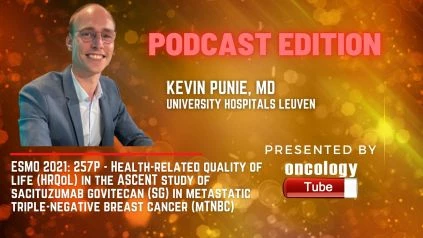Kevin Punie, MD Medical Oncologist Specialized in treatment of TNBC from the University Hospitals Leuven, Belgium speaks about ESMO 2021 Abstract – 257P – Health-related quality of life (HRQoL) in the ASCENT study of sacituzumab govitecan (SG) in metastatic triple-negative breast cancer (mTNBC).
Link to Abstract:
https://cslide.ctimeetingtech.com/esmo2021/attendee/confcal_4/presentation/list?q=257P
Abstract:
Origins:
The anti–Trop-2 antibody is linked to SN-38 by a unique hydrolyzable linker in SG, which is an antibody-drug conjugate. In the ASCENT intention-to-treat study, SG substantially improved progression-free survival (PFS; median 4.8 vs 1.7 mo) and overall survival (OS; median 11.8 vs 6.9 mo) in the second line or larger (2L+) mTNBC scenario compared to single-agent chemotherapy of physician’s choice (TPC). In this paper, we look at the effect of SG on HRQoL in the ASCENT trial.
Methodologies:
Patients with mTNBC who had undergone at least two prior systemic treatments (at least one for metastatic disease) were randomly assigned to either SG (10 mg/kg IV on days 1 and 8, every 21 days) or TPC (capecitabine, eribulin, vinorelbine, or gemcitabine). The EORTC QLQ-C30 was used to measure HRQoL at baseline (BL), before each cycle, and at the conclusion of therapy (Tx). All patients with valid HRQoL measurements at baseline and at one post-BL visit were included in the HRQoL analysis. To assess differences in overall least-square (LS) mean changes from BL between Tx arms, linear mixed-effect models for repeated measures were computed using on-Tx data for cycles 2 to 6 (where n was 25 in both arms).
Outcomes:
There were 419 points (236 SG; 183 TPC) in the HRQoL study (median age, 54 y; median prior regimens, 4; brain metastases present, 11 percent ). At BL, the Tx arms had similar mean QLQ-C30 subscale scores. In terms of global health status (GHS, 0.7 vs. -3.4), physical (1.3 vs. -4.4), and emotional functioning (3.3 vs. -0.5), SG outperformed TPC (Table), with reduced symptomatic effect of tiredness (2.0 vs. 7.1), pain (-8.9 vs. 1.9), dyspnea (-3.8 vs. 4.0), and sleeplessness (-3.8 vs. 4.0). (-4.7 vs 0.3). Only diarrhea was substantially and meaningfully worse with SG of all symptoms (14.1 vs. -1.3).
Summary of findings:
In patients with 2L+ mTNBC, SG not only improved HRQoL but significantly extended PFS and OS compared to TPC. Although the symptoms of diarrhea were worsened by SG, this did not appear to have a negative influence on the patients’ overall health or functioning.
Clinical trial identification
NCT02574455.

